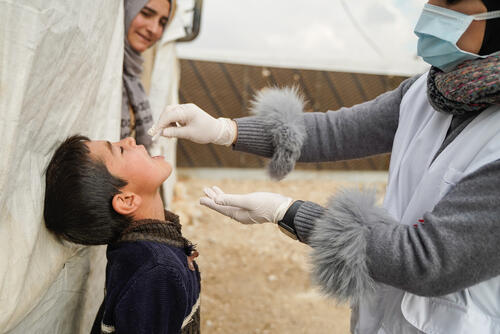Although COVID-19 cases started to decline in 2022, it still proved to be an exceptionally challenging year. Ongoing conflicts, extreme weather events and rising food prices all took their toll on people’s ability to access healthcare around the world, including routine immunisation programmes. These events also contributed to increases in outbreaks of preventable diseases, such as measles and cholera, as well as malnutrition.
Throughout the year, Médecins Sans Frontières (MSF) teams worked to respond to these overlapping crises, running vaccination campaigns that reached millions of people, as well as providing diagnosis and treatment for cholera, measles, yellow fever, meningitis, hepatitis E and acute diarrhoea, within a broader range of diseases that affected people across the globe.
Epidemics
For years, but especially since the COVID-19 pandemic, many health systems have been struggling to cope with multiple emerging and re-emerging diseases while trying to maintain basic health services. The consequent disruptions in healthcare left over 25 million children worldwide without routine vaccinations for diphtheria, tetanus and pertussis in 2021; similar figures are likely to be reported for 2022.
Measles outbreaks continue to increase, even in high-income countries like the US. It is estimated that over 61 million doses of measles-containing vaccine were postponed or missed due to COVID-19-related delays in supplementary immunisation activities across 18 countrieshttps://www.cdc.gov/globalhealth/measles/data/global-measles-outbreaks.html. According to World Health Organization surveillance data, the number of countries experiencing large and disruptive outbreaks increased from 19 in 2021 to 29 in 2022.
Since mid-2021, there has been a deeply concerning upsurge in cholera, in terms of the number of cases and deaths, as well as the size and concurrence of outbreaks. Alarmingly, the disease has spread to countries that had been free of it for many years, such as Haiti, Lebanon and Syria, where factors such as conflict, forced migration, economic crisis and the COVID-19 pandemic have had a negative impact on living conditions and healthcare provision.
Meanwhile, cholera-endemic countries that have worked hard in recent years to prevent and control outbreaks have seen their efforts thwarted. By the end of 2022, an unprecedented 30 countries were experiencing cholera outbreaks, and dozens continue to report caseshttps://www.who.int/publications/m/item/multi-country-outbreak-of-cholera--external-situation-report--1---28-march-2023. In most of the countries where MSF works, our teams continue to support the cholera response with both preventive and curative activities, including vaccination, diagnosis, treatment and the provision of water and sanitation.
As the climate emergency worsens, extreme weather events, such as floods and drought will increase, causing further waves of displacement – ideal conditions for outbreaks of transmittable diseases including cholera. Unless we invest in systems that build preparedness and resilience among people at risk, scaling up vaccination coverage and establishing reliable and safe sources of water and sanitation, the world will be forced to respond to more frequent and more extensive outbreaks in the short and long term.
MSF doubles response amid malnutrition crisis
Another interlinked health emergency that our teams witnessed in 2022 was the rise in malnutrition. The deterioration of food security driven by droughts and floods, conflict, high domestic food prices and the rise in diseases, exacerbated by a shortage of global resources, contributed to the huge increase in the number of malnourished children we treated in our facilities during the year.
Malnutrition makes a child more susceptible to infectious diseases, as it affects their immune system, while diseases such as cholera reduce their nutrient intake and make them more likely to become malnourished.
As a result of low food security and poor healthcare in 2022, the number of malnourished children MSF treated as outpatients more than doubled compared to the previous year, while the number we admitted to hospitals increased by more than 50 per cent. In total, over half a million children were treated for malnutrition by our teams.
Globally, the gap between needs and funding increased, which meant that in some places, MSF was the main health provider. In Nigeria’s North West region, for example, the risk of malnutrition was high, with ongoing insecurity, poor funding and a lack of preventive healthcare.
As well as responding to repeated outbreaks of measles, malaria and diarrhoea diseases, our teams treated over 200,000 patients for malnutrition. MSF also provided treatment for tens of thousands of malnourished patients in other countries, including Chad, Niger, Democratic Republic of Congo and Somalia, where our teams witnessed similar situations.
However, these worrying numbers do not necessarily reflect the true situation in the community, as during emergencies, access to essential services is often severely hampered by many social and environmental factors, including conflict and/or floods, leaving large groups who are at risk of malnutrition unattended.
MSF conducted several assessments, including in Nigeria, where in some insecure areas, we found that up to a fifth of children were severely malnourished. The situation was similarly dire in Somalia, which experienced its worst and longest drought in 40 years.
As all the drivers in health emergencies are structural, and funding is often limited in these countries, the situation is unlikely to change without significant action to address the gaps. This critical health emergency is largely underreported, as other large global events, such as the war in Ukraine, occupy the world’s attention. For this reason, MSF continues to call for a greater international response to address these urgent needs.



